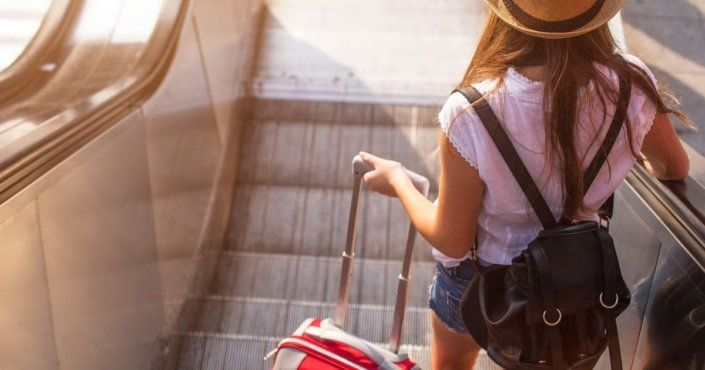Vacationing Safely During COVID-19
Vacationing Safely During COVID-19
You might be considering how COVID-19 will affect your holiday and holiday programs. The disease due to the coronavirus is extremely contagious, specifically the delta variant, and will make traveling dangerous, for you personally and for the communities you go to. COVID-19 can be extremely serious and also fatal. It’s vital that you consider risks when coming up with travel plans.
Should you choose have to travel, you can find actions you can take to help guard yourself from COVID-19.
Way to improved wellness
Pick a location you feel more comfortable with.
Metropolitan areas and states have various amounts of COVID-19 cases. In the event that you plan to traveling, make sure you will not an area that’s seeing a higher infection rate. Preferably, the amount of positive situations that area offers should steadily decline (or decrease) for 14 days before you check out.
Try to decide on a location that isn’t extremely congested with a lot of people. Outdoor holidays away from touristy locations are perfect.
You should check up on any travel limitations and quarantine guidelines both in hawaii that you go to and is likely to state. Some claims may require one to quarantine yourself for just two 14 days after returning from places with high case amounts.
It’s also vital that you consider who you will end up seeing once you travel. In case you are going to an elderly relative, for example, you might want to reconsider. Older people are in the best risk group so you can get significantly ill from COVID-19, even with getting vaccinated. It is necessary you don’t unknowingly pass on any germs to old family members.
Determine how you need to travel.
Knowing where you’re heading, you’ll need to choose ways to get there. The safest way for travel could be driving. The reason being it is possible to control your environment greatest is likely to car. You are in charge of cleaning it.
Nevertheless, this might also mean you need to stay static in hotels or visit restaurants. It’s vital that you stop less than possible. More stops mean additional germs. Bringing your personal food or traveling brief distances that don’t need hotels might help with this. Nevertheless, if you do have to stop, it’s vital that you know where you’re heading.
Verify the COVID-19 plans of the places beforehand. Some essential questions to ask are usually:
- Do you know the cleaning routines as of this location?
- Any kind of restrictions for just how many individuals can visit at once?
- Exactly what will you perform if a worker or visitor tests optimistic for COVID-19?
- In a eating place, is there a patio space where we are able to be seated from other visitors?
- In a hotel, just how long provides it been since another person stayed in the area? What cleaning has had place since that time?
Always pack hands sanitizer and cleaning products like disinfectant wipes. Use a mask all the time in public areas except when consuming or drinking. Bring additional masks along.
Take precautions in the event that you fly on an airplane.
On an airplane, you have much less control of one’s environment. Nevertheless, if you want to fly, there are usually actions you can take to lower your threat of getting COVID-19:
- Masks are needed at all times if you don’t are consuming or drinking. This consists of if you are in the airport terminal and on the plane.
- Window chairs could be safer than aisle or center seats, as you’ll be farther away from individuals moving in the aisles.
- Touch less than possible. This consists of armrests and tray tables, along with anything in the bathrooms. Use hands sanitizer after touching anything.
- If you want to use the restroom, work with a document towel or hands wipe to the touch any common areas, like sink or doorway handles.
Points to consider
It’s vital that you keep in mind that COVID-19 is quite serious when travelling. The most typical way to obtain it will be by inhaling respiratory droplets in the surroundings. When a one who has COVID-19 coughs or sneezes, small droplets depart their mouth and nasal area and go in to the air flow. If you’re within 6 foot of that person, you might breathe them in.
COVID-19 may also be shared through touching areas an infected individual has touched. Nevertheless, it is not as likely you’ll capture COVID-19 in this manner.
Traveling boosts your contact with other people also to germs, and therefore it could increase your threat of obtaining COVID-19. Even though you think you’ll only have a slight case, you may even move it along to individuals who are more prone to be severely suffering from it. This consists of people 65 yrs . old and older and folks who have medical issues, such as cardiovascular disease, lung condition, or diabetes.
The delta variant of COVID-19 is extremely contagious. You need to take precautions even though you and your loved ones have obtained the COVID-19 vaccine. Vaccinated people can nevertheless get unwell from COVID-19 and spread the herpes virus.
When to notice your doctor
In the event that you experience any observeable symptoms of COVID-19, whether before or after vacationing, contact your physician immediately. COVID-19 symptoms range from:
- Fever
- Cough
- Shortness of breath
- Chills
- Repeated shaking with chills
- Muscle discomfort
- Headaches
- Sore throat
- New lack of taste or odor
For those who have a weakened disease fighting capability, COVID-19 might lead to pneumonia or bronchitis.
